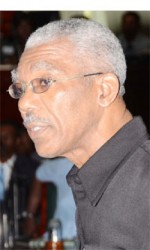With the future of oil search activities in the offshore Roraima block still uncertain after last week’s seizure by Caracas of a ship in Guyana’s waters, Opposition Leader David Granger yesterday declared that the government’s engagement with Venezuela this week solved nothing.
“The meeting solved nothing,” Granger told a news conference yesterday, one day after Delegations from Guyana and Venezuela held talks on Thursday in Port-of-Spain, Trinidad to discuss the Venezuelan navy’s seizure of the oil exploration vessel Teknik Perdana and decided to have their technical experts meet in four months to discuss maritime delimitation.

Granger yesterday called on President Donald Ramotar to convene a Border and National Security committee in the wake of the incident, saying that it should immediately consider the implications of, and Guyana’s response to, the “unprecedented seizure” of the unarmed survey vessel.
After an eight-day detention, the Teknik Perdana sailed last evening from Venezuela, the Foreign Affairs Ministry announced last evening.
“The Ministry of Foreign Affairs wishes to inform that the R/V Teknik Perdana sailed this evening from Venezuela,” Ambas-sador Elizabeth Harper said in a one-line statement.
The detention of the vessel led to the talks on Thursday, after which Minister of Foreign Affairs Carolyn-Rodrigues-Birkett and the People’s Minister for Foreign Relations of the Bolivarian Republic of Venezuela, Elias Jaua Milano agreed to explore mechanisms within the context of international law to address the issue of maritime delimitation.
But the outcome of the meeting was found wanting by Granger, who yesterday said he was astonished at the failure to “address the dangerous use, or threat of the use of armed force by Venezuela against Guyana, which is a contravention of Article 2 (4) of the Charter of the United Nations.”
He also chided Guyana’s response to the challenge made by Venezuela to Guyana’s territory, and said that the role of the National Assembly, the Government of Guyana and the capacity of the Foreign Affairs Ministry need to be enhanced to be able to properly respond to such challenges.
This situation could have been avoided altogether if the government heeded to recommendations made over a decade ago, he argued.
He pointed out that in 2001, the Border and National Security Commit-tee, which he co-chaired, compiled a report which made several recommendations, including for consultations at the highest level to discuss and resolve issues pertaining to border and national security. Such discussions were to take place between the President and the Leader of the Opposi-tion since, “this level of engagement represents the core of the bi-partisan approach.”
The report also recommended that Standing Committee of Parliament be established to address, specifically, border and national security issues and that the matters should be formally established.
Further, it recommended that the bi-partisan approach be supported by a technical/academic component in the form of an Institute of Border Studies, a strengthened frontiers unit of the Foreign Affairs Ministry and the review or consolidation of existing institutions where there is overlap and duplication of functions or which are ineffective. The implementations of the report will put Guyana on the road of addressing this and future challenges to its territory but Granger said that additional steps will also have to be taken.
He said that Guyana must try to rally support for its case from other countries in the region, and even take the matter to international organizations such as the United Nations. Putting the matter before an International Tribunal is also an option, Granger noted. It was an Inter-national Tribunal which awarded Venezuela and Guyana portions of disputed territory in 1899.
However, Granger says, since maritime delimitations were not addressed at the time a new Tribunal may be required to settle this new issue.
The vessel’s captain, Ukrainian Igor Bekirov, was charged “for allegedly failing to meet the special regime of security zones as specified in the organic laws on Water Areas and Security.” He will be required to appear in court for pending proceedings and will be summoned through Guyana’s Embassy in Caracas.
He has also been banned from conducting oil exploration and research activities in “Venezuela’s territory,” according to El Universal, the Venezuelan news publication, raising questions about whether Guyana would be allowed to continue its seismic surveys as part of its oil exploration venture in the area in question. Bekirov has been banned from captaining such expeditions, but it remains unclear whether the ban extends to all such activities.
When contacted yesterday on this question, Minister of Natural Resources and the Environment Robert Persaud, who participated in Thursday’s meeting in Trinidad, declined to comment and referred all such question to Rodrigues-Birkett. Rodrigues-Birkett, however, failed to immediately return calls made to her.
Guyana has maintained that the ship was intercepted in this country’s 200-mile Exclusive Economic Zone (EEZ), where the it was conducting seismic surveys for Anadarko Petroleum. The ship was intercepted by a Venezuelan naval vessel, the Yakuana, then ordered and escorted to the island of Margarita. Since the incident both Guyana and Venezuela expressed their disappointment over the handling of the situation, with Guyana noting that it could be a serious threat to peace and Venezuela stating that an explanation was in order from Guyana as to why permission was granted for scientific prospecting and exploration of the continental shelf.




